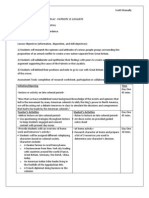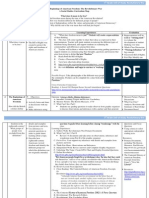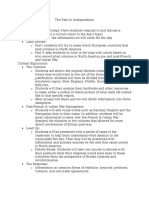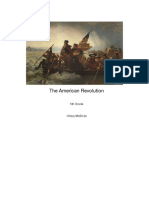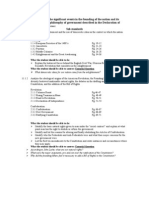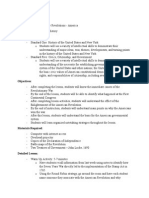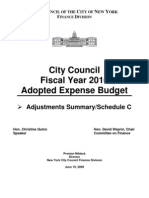4th Grade Social Studies: Colonial America: Unit Topic and Length
4th Grade Social Studies: Colonial America: Unit Topic and Length
Uploaded by
api-278025126Copyright:
Available Formats
4th Grade Social Studies: Colonial America: Unit Topic and Length
4th Grade Social Studies: Colonial America: Unit Topic and Length
Uploaded by
api-278025126Original Title
Copyright
Available Formats
Share this document
Did you find this document useful?
Is this content inappropriate?
Copyright:
Available Formats
4th Grade Social Studies: Colonial America: Unit Topic and Length
4th Grade Social Studies: Colonial America: Unit Topic and Length
Uploaded by
api-278025126Copyright:
Available Formats
Sonyi Lopez
4th Grade Social Studies: Colonial America
Unit Topic and Length:
This unit will last between five and six weeks. It could serve as a bridge between units
like early colonization of America/Native Americans and the American Revolution.
Common Core Content Standards:
Standard 1: History of the United States and New York - Students will use a variety of
intellectual skills to demonstrate understanding of major ideas, themes, developments
and turning points in world history and examine the broad sweep history from a variety
of perspectives.
Standard 3: Geography - Students will use a variety of intellectual skills to demonstrate
their understanding of the geography of the interdependent world we live - local,
national, global - including the distribution of people, places and environments over the
Earths surface.
Standard 4: Economics - Students will use a variety of intellectual skills to demonstrate
their understanding of how the US and other societies develop economic systems and
associated institutions to allocate scarce resources, how decision making units function
in the US and other national economies, and how an economy solves the scarcity
problem through market and nonmarket mechanisms.
Standard 5: Civics, Citizenship and Government - Students will use a variety of
intellectual skills to demonstrate their understanding of the necessity for establishing
governments; the governmental system of the US and other nations; the US
Constitution; the basic civic values of American constitutional democracy; and other
roles, rights, and responsibilities of citizenship, including the avenues of participation.
Big Ideas/Enduring Understandings:
Common people managed to create an independent society which turned into a nation.
The people rebelled against a king who lived thousands of miles away, and successfully
achieved independence.
The people rebelled by writing articulate justifications of their dissatisfaction, boycotting
foreign-made goods, and eventually, with warfare.
Essential Question:
How did America become a country?
Content:
Key concepts that will be covered in this unit include:
French and Indian War
Reasons they wanted to be independent - taxation, conflicting religious beliefs
Stamp (1765) & Sugar Acts
Boston Tea Party (1773)
Treaty of Paris
Turning points during the time period that led to the Revolution
Declaration of Independence
Bill of Rights
Influence of key figures (John Adams, TJ, King George, Patriots vs. Loyalists)
Colonial Life - dress, food
Key knowledge students will acquire and demonstrate as a result of this unit include:
Students will be able efficiently use technology in order to study the causes and key
concepts of major historical events.
Students will use reference materials such as dictionaries and thesaurus to look and
better understand key terms which the unit addresses.
Students will be able to in a cooperative learning groups discuss how key vocabulary
from the unit can apply to specific nonfiction texts.
Students will be able to collaborate efficiently by allowing for each student to
demonstrate equal contribution.
Students will be able to extract commonalities amongst a group of individuals.
Students will be able to make text to self by comparing and contrasting themselves with
characters in the text.
Students will be able to demonstrate their understanding of point of view by comparing
and contrasting.
Students will be able to make text-to-self connections through role play and developing
arguments to support opinions according to the role they have been assigned.
Students will be able to make text-to-world connections by visiting historical places and
making connections between the text and the world around them.
Students will be able to make inferences in regards to expectations about the field trip
based up knowledge gathered from multiple texts, assignments, and activities thus far.
Students will be able to align their inferences with their reflections on their experience at
the historical site.
Students will be able to recognize the importance of educational field trips and the
overall impact on their learning experiences.
Skills:
Key literacy skills that will be addressed in this unit include:
Investigating
Students will gain an understanding of content knowledge through investigating a
diverse range of informational texts and media.
Interpreting
Students will work through activities that have a real-world context in order to relate to
the point of view of individuals that lived during Colonial America.
Comparing
Students will compare current events to the struggles that common people endured to
foster a deeper understanding of new content knowledge.
Explaining
Students will reenact past practices such as writing about their dismay with the kings
actions, developing a logical argument supported with textual evidence and explaining
their rationale.
Analyzing
Students will analyze an array of political cartoons and authentic documents to facilitate
comprehension for the causes and effects of events in Colonial America.
Connecting
Students will connect the dissatisfaction of the common people to themselves by writing
about an injustice that was pressed upon them. Then, pupils will develop a course of
action and highlight similarities or differences with the way the common people reacted.
Vocabulary/Key Terms:
Articles of Confederation - An agreement between the thirteen colonies to form a
single government under the United States of America. It served as the country's first
constitution.
Bill of Rights - The first ten amendments to the Constitution that guaranteed the rights
of the individual.
Colony - An area of land that is under the control of a country, but not fully part of the
country.
Confederation - The group of thirteen states that united together.
Constitution - A set of documents and laws that define the government of a country.
Continental Congress - A group of delegates from each colony or state. It became the
first governing body of the United States of America.
Continental army - The official army of the United States that was established by the
Continental Congress.
Declaration of Independence - A document which announced that the American
colonies now considered themselves independent states and they would no longer
answer to the authority of Great Britain.
Democracy - A type of government that is ruled directly by the people.
Federalist - A person who supported the adoption of the Constitution.
Legislature - A branch of government that has the power to make laws.
Loyalist - A person in America who stayed loyal to Britain and the king.
Militia - Citizens who were prepared to fight. They held drills a few times a year and had
their own weapons and gear.
Minutemen - Part of the Massachusetts militia that was prepared to fight at a moment's
notice.
Patriot - An American that wanted independence from Britain.
Republic - A type of democratic government where people elect officials to represent
them.
Revolution - The overthrow of a government to establish a new system.
Stamp Act - A tax placed on the American colonies by the British government. It taxed
all sorts of paper documents including newspapers, magazines, and legal documents.
Treaty of Paris - A treaty signed by both the United States and Britain that ended the
Revolutionary War.
Initial Assessment:
Students will take a survey as an initial assessment of what their background
knowledge on Colonial America is. As we continue in our unit , students will complete a
KWL chart as an ongoing assessment.
Formative Assessment:
Students will create a formative assessment by writing about three specific causes of
the American Revolution. The writing pieces will be a part of a bound book. It will
include final copies of drafted and edited work about the causes and how they affected
the revolution. The writing pieces will be accompanied by student illustrations. The
work will be bound using yarn or string to make the books look like books from the time
period. It will showcase skills acquired during the unit like understanding cause and
effect, point of view, and
Final Performance Task:
The final performance task is the books final product. This will be graded based on
how the students edited and revised their writing, presentation (neatness and effort put
into illustrations), and content and depth of their writing.
Learning Plan and Activities:
Students will read Dear America series book, Standing in the Light: The Captive Diary
of Catharine Carey Logan, Delaware Valley, Pennsylvania, 1763, alongside this unit to
integrate English into social studies. This book incorporates what the students already
learned about with Native Americans but shows the interaction that colonist may have
had with them during the time period. This book can be used to demonstrate concepts
like perspective and recording history.
Students will do a webquest, using sources like scholastic.com and brainpop.com, to
find out information about the causes of the American Revolution and the end of
Colonial America. This will be used as a the first step in research used to create their
books (formative assessment).
Students will work in teams to look up the words in the key vocabulary list. Students will
share definition of these terms. Students will discuss how these terms fit into the
creation of The Constitution. Students will create an in class Bill of Rights in groups.
Teacher will explain that the entire class must agree on these ten rights.
Students will connect the dissatisfaction of the common people to themselves by writing
about an injustice that was pressed upon them. Then, pupils will develop a course of
action and highlight similarities or differences with the way the common people reacted.
Students will work through activities that have a real-world context in order to relate to
the point of view of individuals that lived during Colonial America. For example, the
class may be split up into groups (Patriots vs. Loyalist) and work together in a shortresearch project. Using goal sheets to distribute responsibility among the students, they
will become accountable for their own learning and cite evidence to prepare for a
debate. Students will develop a logical argument for why the King is infallible or why the
king is fallible.
Students will record their thoughts in the form of a journal entry as to their expectations
of their field trip to the historic site. Students will use their knowledge gained from
multiple texts and prior assignments to make inferences about their field trip.
Students will visit a historic site Colonial Williamsburg where decisions were made
regarding the land and its first inhabitants, colonization, and conflict, revolution and the
new nation, political growth and western expansion. With a focus on United States
history,students see where our founding fathers (George Washington, Thomas
Jefferson, Patrick Henry, and George Mason) developed their ideas about liberty,
government by the people, and citizenship through an Electronic field trip.
Students will reflect on their field trip visit to the historic site which the class has visited.
The students will be asked to align their reflection with their expectations and explain
what they did expect, what they did not infer and how and why it may have been
different from what they expected. The students will also be required to explain why a
trip like this is beneficial to expanding their learning experience of the overall unit.
Resources:
Scholastic resource for Dear America series:
http://www.scholastic.com/teachdearamerica/colonial_books.htm#sthash.nv6BE7C7.dp
uf
scholastic.com
brainpop.com
http://www.oxforddictionaries.com/us/
http://www.history.org/history/teaching/eft/index.cfm
Support for Struggling Students and ELLs:
Modified rubrics and assessment guidelines
Extra practice sheets geared toward targeting skills that students need to remediate
Visual representations of information to help inform students about students
(infographic, pictures, timelines)
Writing guides and checklists
Pre-due date: Students that need extra help with their writing can hand their work in at
an earlier date and go over their work with the teacher who will provide feedback for
improvement. That way, when the assignment is due, the student has a better chance
of getting a desirable grade while at the same time, has an opportunity to reinforce
writing skills.
You might also like
- Wiat-Iii ReportDocument4 pagesWiat-Iii Reportapi-278025126No ratings yet
- United States History - 8th Grade Unit PlanDocument5 pagesUnited States History - 8th Grade Unit Planapi-361751701No ratings yet
- American Revolution UBDDocument14 pagesAmerican Revolution UBDbcoleman91No ratings yet
- Lesson Plan: Roleplay - Patriots Vs LoyalistsDocument3 pagesLesson Plan: Roleplay - Patriots Vs LoyalistsScott McAnallyNo ratings yet
- Course Description Ap United States History 2017-2018Document14 pagesCourse Description Ap United States History 2017-2018api-362995369No ratings yet
- 806 SsunitDocument6 pages806 Ssunitapi-241358660No ratings yet
- Unit Plan - The American Revolution Alyssa Landroche RationaleDocument14 pagesUnit Plan - The American Revolution Alyssa Landroche Rationaleapi-352413835No ratings yet
- Stage 1 Final DraftDocument33 pagesStage 1 Final Draftapi-341798472No ratings yet
- Hillpepinunitwriteup 1Document42 pagesHillpepinunitwriteup 1api-252759873No ratings yet
- Elainstructionalunit Part1Document3 pagesElainstructionalunit Part1api-298987924No ratings yet
- Unit PlanDocument33 pagesUnit Planapi-341660769No ratings yet
- The Beginnings of American Freedom 1 2Document22 pagesThe Beginnings of American Freedom 1 2api-273985023No ratings yet
- The Path To Independence Lesson PlanDocument2 pagesThe Path To Independence Lesson Planapi-314534747No ratings yet
- UpoDocument23 pagesUpoapi-402311716No ratings yet
- Grades: 6th-8th Standard Two:: Achievement GoalDocument9 pagesGrades: 6th-8th Standard Two:: Achievement GoalFernandes RudolfNo ratings yet
- Revolutionary War Unit Plan: 5th GradeDocument33 pagesRevolutionary War Unit Plan: 5th Gradeapi-341826216No ratings yet
- Digital Unit Plan Template - New ImperialismDocument7 pagesDigital Unit Plan Template - New Imperialismapi-344059904No ratings yet
- SDocument26 pagesSapi-561651966No ratings yet
- Digital Unit Plan TemplateDocument3 pagesDigital Unit Plan Templateapi-271147220No ratings yet
- Atlantic Revolutions UnitDocument35 pagesAtlantic Revolutions Unitapi-286315119No ratings yet
- Unit Outline Template: 5 Grade: United States History Since 1860Document4 pagesUnit Outline Template: 5 Grade: United States History Since 1860api-334248047No ratings yet
- Themes & Essential Questions For This Unit How Students Will Demonstrate Their Understanding Strategies ResourcesDocument3 pagesThemes & Essential Questions For This Unit How Students Will Demonstrate Their Understanding Strategies Resourcesapi-320480630No ratings yet
- 4. Social StudiesDocument2 pages4. Social StudiesEjNo ratings yet
- Course Plan 1Document12 pagesCourse Plan 1api-287993401No ratings yet
- Tled 435 - Lesson PlanDocument34 pagesTled 435 - Lesson Planapi-509965619No ratings yet
- The Reluctant Revolutionaries OverviewDocument6 pagesThe Reluctant Revolutionaries OverviewUnknown humanNo ratings yet
- The American Revolution: 5th GradeDocument8 pagesThe American Revolution: 5th Gradeapi-300963759No ratings yet
- Lesson Plan 1: Road To Revolution Class/Subject: 7th/8th Grade Social Studies Date: 03/26/2013Document4 pagesLesson Plan 1: Road To Revolution Class/Subject: 7th/8th Grade Social Studies Date: 03/26/2013omfoor1No ratings yet
- Edsc304 DigitalunitplantemplateDocument4 pagesEdsc304 Digitalunitplantemplateapi-280937799No ratings yet
- Colonization of Americas Unit PlanDocument10 pagesColonization of Americas Unit Planapi-643284315No ratings yet
- Political Cartoon Lesson PlanDocument9 pagesPolitical Cartoon Lesson PlanNicolas SawickyNo ratings yet
- Unit Plan For The Constitution For WeeblyDocument7 pagesUnit Plan For The Constitution For Weeblyapi-339988723No ratings yet
- Digital Unit Plan Template Unit Title: The Independence of A Nation Name: Judith Cuellar Content Area: Social Science Grade Level: 11 GradeDocument4 pagesDigital Unit Plan Template Unit Title: The Independence of A Nation Name: Judith Cuellar Content Area: Social Science Grade Level: 11 GradeAnonymous QvgD7SFvnNo ratings yet
- Lesson 5Document5 pagesLesson 5api-286837832No ratings yet
- 11 - 1 Unit PlanDocument4 pages11 - 1 Unit PlanRyan ParkerNo ratings yet
- DRL Lesson Plan - The Stamp Tax UproarDocument7 pagesDRL Lesson Plan - The Stamp Tax Uproarapi-308065876No ratings yet
- Imperialism Cartoons Lesson PlanDocument3 pagesImperialism Cartoons Lesson Planapi-543931197No ratings yet
- Unitplanoverviewfall 16Document2 pagesUnitplanoverviewfall 16api-334861434No ratings yet
- Un-Announced Ss ObservationDocument3 pagesUn-Announced Ss Observationapi-272641754No ratings yet
- Upo Template FinalDocument15 pagesUpo Template Finalapi-278504569No ratings yet
- 3-5 ColoniesDocument3 pages3-5 ColoniesDaniela SuazoNo ratings yet
- Tws 3 Short Range ObjectivesDocument3 pagesTws 3 Short Range Objectivesapi-252713867No ratings yet
- Unit Plan NarrativeDocument5 pagesUnit Plan Narrativeapi-219914719No ratings yet
- The Real RevolutionDocument70 pagesThe Real RevolutionCarloB5No ratings yet
- Manifest Destiny-Power of PerspectiveDocument5 pagesManifest Destiny-Power of Perspectiveapi-233755289No ratings yet
- Final Declaration of Independence - 5 Day Lep-2Document12 pagesFinal Declaration of Independence - 5 Day Lep-2api-535015002No ratings yet
- Fictional Government Zines Lesson 1Document7 pagesFictional Government Zines Lesson 1api-270973747No ratings yet
- US Govt - Culturally Relevant Mexican American Viewpoint - Grade 12Document15 pagesUS Govt - Culturally Relevant Mexican American Viewpoint - Grade 12DA MoralesNo ratings yet
- Dictators Lesson PlanDocument4 pagesDictators Lesson Planapi-232736508No ratings yet
- Digital Unit Plan TemplateDocument5 pagesDigital Unit Plan Templateapi-270339214No ratings yet
- Causes of The American Revolution 5 Grade Unit Plan Kaitlyn Oakes GVSU Winter 2020 SST 309 04Document37 pagesCauses of The American Revolution 5 Grade Unit Plan Kaitlyn Oakes GVSU Winter 2020 SST 309 04api-534565414No ratings yet
- US Govt - Culturally Relevant African American Viewpoint - Grade 12Document15 pagesUS Govt - Culturally Relevant African American Viewpoint - Grade 12DA MoralesNo ratings yet
- Us History IDocument28 pagesUs History Iapi-265898351No ratings yet
- Unit of Study 2 For PortfolioDocument6 pagesUnit of Study 2 For Portfolioapi-284405602No ratings yet
- Lesson Plan Two Theme: Eighteenth Century Revolutions - America Grade: 10 GoalsDocument2 pagesLesson Plan Two Theme: Eighteenth Century Revolutions - America Grade: 10 GoalsSean MillerNo ratings yet
- Concept Formation Lesson Plan 1Document2 pagesConcept Formation Lesson Plan 1Poet CruzNo ratings yet
- Essay Questions On Colonial America and The American RevolutionDocument2 pagesEssay Questions On Colonial America and The American RevolutionYulia CookNo ratings yet
- Development UnitDocument14 pagesDevelopment Unitapi-187838124No ratings yet
- 10 Siop Lesson PlanDocument4 pages10 Siop Lesson Planapi-318500225No ratings yet
- AssessmentsDocument11 pagesAssessmentsapi-341830053No ratings yet
- Sonyi Santos Resume (2015)Document2 pagesSonyi Santos Resume (2015)api-278025126No ratings yet
- Math Area and Perimeter Lesson PlanDocument2 pagesMath Area and Perimeter Lesson Planapi-278025126No ratings yet
- Cause and Effect Ela Lesson ReflectionDocument1 pageCause and Effect Ela Lesson Reflectionapi-278025126No ratings yet
- Ela Lesson - Daily Roman Life in The City, Part IIDocument3 pagesEla Lesson - Daily Roman Life in The City, Part IIapi-278025126No ratings yet
- Ela Literacy Lesson - Cause and EffectDocument3 pagesEla Literacy Lesson - Cause and Effectapi-278025126100% (1)
- School Profile Analysis Spring 2015Document8 pagesSchool Profile Analysis Spring 2015api-278025126No ratings yet
- Karta Pracy Prepositions of Place PLDocument12 pagesKarta Pracy Prepositions of Place PLhhbflat100% (1)
- Resume - Pallavi DasariDocument2 pagesResume - Pallavi Dasariapi-283879688No ratings yet
- Megan Davis ResumeDocument3 pagesMegan Davis Resumeapi-509554059No ratings yet
- ACPC - GUJCET 2014 Cutoff Ranks Merit WiseDocument13 pagesACPC - GUJCET 2014 Cutoff Ranks Merit WiseLohith_EnggNo ratings yet
- Research Proposal Final ExamDocument16 pagesResearch Proposal Final ExamDe AlaipNo ratings yet
- Cambridge International General Certificate of Secondary EducationDocument16 pagesCambridge International General Certificate of Secondary Educationmuhammad.junaid.saNo ratings yet
- ENGLISH GRADE 9 Summative TestDocument2 pagesENGLISH GRADE 9 Summative TestFur MayNo ratings yet
- 25 Best Recruitment Agencies in Dubai (2019)Document4 pages25 Best Recruitment Agencies in Dubai (2019)Shoaib AhmedNo ratings yet
- BBA in Human Resources: Preparing For Management RolesDocument14 pagesBBA in Human Resources: Preparing For Management RolesKR MangalamNo ratings yet
- Ucl Department of Political Science School of Public Policy: POLS6005B International SecurityDocument7 pagesUcl Department of Political Science School of Public Policy: POLS6005B International SecurityAngela BatuureNo ratings yet
- Pie Chart PDFDocument8 pagesPie Chart PDFครูไก่น้อย หนูพัดNo ratings yet
- Check List: Before DepartureDocument3 pagesCheck List: Before DepartureElenaAmbrusNo ratings yet
- A Comparative Study On The Level of Mathematics Performance On Online Learning Between St. Camillus and St. Ferdinand III StudentsDocument4 pagesA Comparative Study On The Level of Mathematics Performance On Online Learning Between St. Camillus and St. Ferdinand III StudentsGeorge Louie MendozaNo ratings yet
- Ma 1 Anh 7 30phut 25cauDocument2 pagesMa 1 Anh 7 30phut 25cautuyenvp93 trinhNo ratings yet
- SL16952 48749 2Document4 pagesSL16952 48749 2simplexit2000No ratings yet
- FY2010 Schedule C Merge FinalDocument407 pagesFY2010 Schedule C Merge FinalAzi PaybarahNo ratings yet
- Monitoring FormDocument3 pagesMonitoring FormElla Jane Manolos PaguioNo ratings yet
- Pakistan: Faraz Ahmed ShaikhDocument3 pagesPakistan: Faraz Ahmed ShaikhfarhansaadatNo ratings yet
- Lesson Plan - Afl Handball 1st - Resource FileDocument7 pagesLesson Plan - Afl Handball 1st - Resource Fileapi-391237319No ratings yet
- Assertion Training: TI 005 - ThematicDocument31 pagesAssertion Training: TI 005 - ThematicRudianto AhmadNo ratings yet
- The Art SurvivalDocument11 pagesThe Art Survivalapi-318032412No ratings yet
- Pe Final ProjectDocument36 pagesPe Final Projectapi-317331795No ratings yet
- Geotechnik Blockprüfung - Module Description BGU50010Document5 pagesGeotechnik Blockprüfung - Module Description BGU50010Devis CamiNo ratings yet
- What Is The Meaning of General Engineering - Google SearchDocument1 pageWhat Is The Meaning of General Engineering - Google Searchjj0203751381No ratings yet
- Lesson Plan For Demo TeachingDocument6 pagesLesson Plan For Demo TeachingBagsit Angelique Khryztelle G.No ratings yet
- DIP Sri LankaDocument3 pagesDIP Sri LankaRuwan Dissanayake100% (1)
- Syllabus ToxicologyDocument2 pagesSyllabus ToxicologyKoert Oosterhuis100% (1)
- Escobar 2010 Preserv CLIL TEDDocument31 pagesEscobar 2010 Preserv CLIL TEDAngelRGBNo ratings yet
- 2015 Contexts - Annual Report of The Haffenreffer Museum of AnthropologyDocument32 pages2015 Contexts - Annual Report of The Haffenreffer Museum of AnthropologyHaffenreffer Museum of AnthropologyNo ratings yet
- MyELT - PW1 - U1 - LS - Lesson A - KEYDocument9 pagesMyELT - PW1 - U1 - LS - Lesson A - KEYQuang vu xuanNo ratings yet



